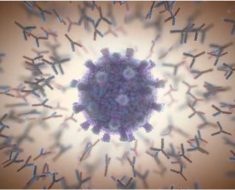The US Food and Drug Administration (FDA) has approved trastuzumab deruxtecan (Enhertu) for the treatment of patients with unresectable or metastatic HER2-low breast cancer.
AstraZeneca’s IV infusion is the first therapy approved for HER2-low breast cancer, a newly defined subset of HER2-negative breast cancer in which there are some HER2 proteins on the cell surface, but not enough to warrant classification as HER2-positive cancer, the agency said in a press release.
The indication is for patients who have received prior chemotherapy in the metastatic setting or for patients whose cancer has returned during adjuvant chemotherapy or within 6 months of completing it.
Approval was based on the DESTINY-Breast04 trial, which included 557 patients with unresectable or metastatic HER2-low breast cancer. The trial had two cohorts: 494 hormone receptor–positive (HR+) patients, and 63 hormone receptor–negative (HR-) patients.
Of these patients, 373 were randomly assigned to received trastuzumab deruxtecan every 3 weeks, and 184 were randomly assigned to receive physician’s choice of chemotherapy (eribulin, capecitabine, gemcitabine, nab paclitaxel, or paclitaxel).
Among patients who received trastuzumab deruxtecan, progression-free survival was longer (10.1 months vs 5.4 months), as was overall survival (23.9 months vs 17.5 months), compared with those in the chemotherapy group.
“Overall, these results establish HER2 low metastatic breast cancer as a targetable population of breast cancer with trastuzumab deruxtecan as a new standard of care in this setting,” Shanu Modi, MD, said at a press conference at the annual meeting of the American Society of Clinical Oncology, where she presented the results.
The most common adverse reactions in the trial were nausea, fatigue, alopecia, vomiting, constipation, decreased appetite, musculoskeletal pain, and diarrhea. The agent carries a black-box warning regarding the risk of interstitial lung disease and embryo-fetal toxicity.
The targeted agent is not recommended for women who are pregnant.
M. Alexander Otto is a physician assistant with a master’s degree in medical science. He is an award-winning medical journalist who worked for several major news outlets before joining Medscape and is an MIT Knight Science Journalism fellow. Email: [email protected].
For more news, follow Medscape on Facebook, Twitter, Instagram, and YouTube.
Source: Read Full Article





